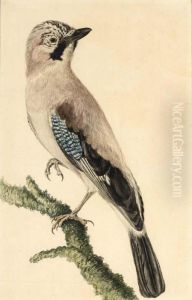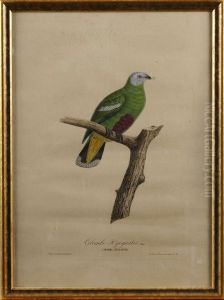Pauline Knip Paintings
Pauline Knip was a Dutch artist born on July 4, 1781, in Amsterdam, the Netherlands. She was born into an artistic family; her father was the landscape painter Joseph August Knip, and her mother, Therese Pauline, was also a painter. Pauline was known for her detailed and realistic illustrations of birds and botanical subjects. Her work contributed significantly to ornithological and botanical art during her time, and she was one of the few women in the early 19th century to gain recognition in this field.
Pauline initially trained under her father and later under Dutch artist Pieter Gerardus van Os. She married the French ornithologist Joseph Knip in 1808, who was her cousin, and through him, she became deeply involved in the study of birds. They later divorced, and she returned to the Netherlands with her daughter. Her marriage and subsequent travels with her husband had a significant influence on her work as she had access to various natural history collections and exotic birds, which she depicted in her art.
Knip's work was characterized by its scientific accuracy and artistic finesse. She worked closely with natural scientists and contributed to several important publications of the time, including 'Les Pigeons' by Coenraad Jacob Temminck, which was a significant work on pigeons containing illustrations of living and stuffed birds. However, despite her contributions, her name was often overshadowed by her male counterparts.
After her divorce, Pauline Knip continued to work and exhibit her art. She was awarded a gold medal at the Salon in Paris in 1824. Her work was also exhibited in the Netherlands, and she received royal patronage from the Dutch King William I, who commissioned her to paint works for his collection.
Pauline Knip's legacy lives on through her contributions to natural history illustration. She died on May 23, 1851, in Paris, France. Today, her artwork is preserved in various institutions around the world, serving as a testament to her skill and dedication to the accurate portrayal of the natural world.

![Paris: Mame For Mme Knip And Garneray, [1808-] 1811](https://www.niceartgallery.com/imgs/725839/s/pauline-knip-paris-mame-for-mme-knip-and-garneray-1808-1811-7b9a2578.jpg)
